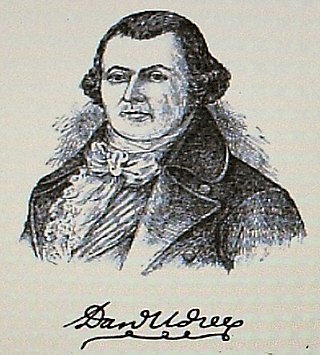Top Qs
Timeline
Chat
Perspective
Daniel Udree
American politician From Wikipedia, the free encyclopedia
Remove ads
Daniel Udree (August 5, 1751 – July 15, 1828) was a Democratic-Republican member of the United States House of Representatives from Pennsylvania.[1][2]
Remove ads
Remove ads
Biography
Summarize
Perspective
Born on August 5, 1751, in Philadelphia, Pennsylvania, Udree was raised in comfortable surroundings by his prosperous uncle, Jacob Winey, and was educated in the public schools of his community. As a young adult, he relocated to Berks County, Pennsylvania, where he became an iron merchant.[3][4]
Udree served in the American Revolution as a colonel. A participant in the Battle of Brandywine, his horse was shot from underneath him. He subsequently served as a major general in the War of 1812.[5]
He was elected to the 13th Congress to fill the vacancy caused by the resignation of John M. Hyneman, and served from October 12, 1813, to March 3, 1815. He was unsuccessful in his reelection bid in 1814.[6][7]
He was then elected to the 16th Congress to fill the vacancy caused by the resignation of Joseph Hiester, and served from December 26, 1820, to March 3, 1821. In 1822, he won election to the 18th Congress, which would begin on March 4, 1823.[8][9]
After the death of Representative Ludwig Worman on October 17, 1822, he won the special election for the seat for the remainder of the 17th Congress and was seated on December 10, 1822, serving until March 3, 1825.[10][11]
After his legislative career ended, he returned to work as a merchant.[12][13]
Remove ads
Death and interment
He died in Reading, Pennsylvania, on July 15, 1828, and was interred at the Oley Cemetery in Oley, Pennsylvania.[14][15]
References
Wikiwand - on
Seamless Wikipedia browsing. On steroids.
Remove ads

